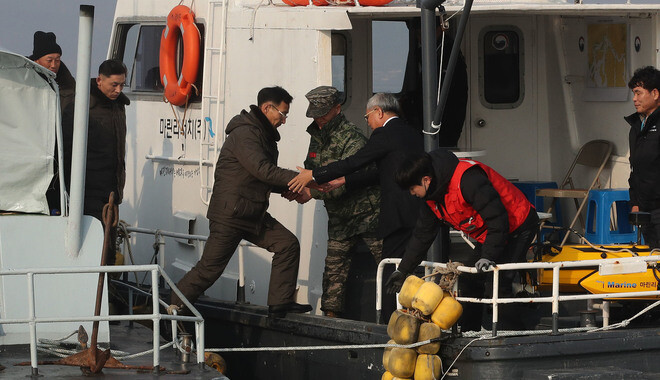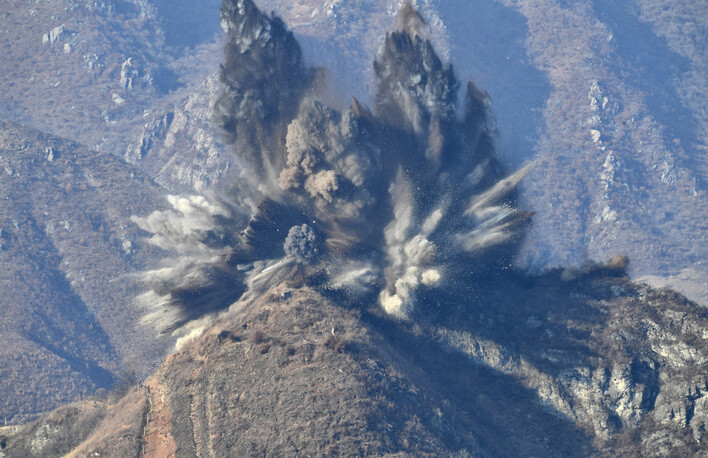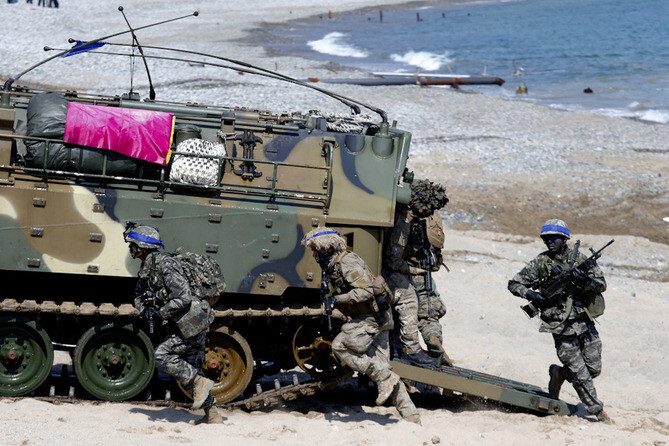hankyoreh
Links to other country sites 다른 나라 사이트 링크
[News analysis] Why does conservative opposition resort to flamboyant attacks on inter-Korean military agreement?

“A security catastrophe.” “De facto disarmament.” “A surrender document.” “The military equivalent of South Korea’s IMF crisis.” “National suicide.”
Critics have resorted to coarse characterizations in their attacks on the inter-Korean military agreement reached on Sept. 19. They are denouncing the agreement as not only utterly undermining the South Korean military’s security capabilities, but also causing a military disaster that exposes Seoul to a surprise North Korean attack. Many are voicing the even more extreme position that South Korea faces the “threat of communism,” having been taken in by Pyongyang’s false peace offensive.
Among the people making these claims, quite a few are individuals who have served in the past as Minister of National Defense or a high-ranking officer in the Joint Chiefs of Staff (JCS). It is certainly worrying when these kinds of arguments are being made by the people who once commanded South Korea’s military. But a closer examination of their claims shows a number of exaggerations and distortion. A few of them are closer to outright deceptions – cloaked in the mantle of “military expertise.”

Former JCS deputy chairman Shin Won-sik has claimed that if the Han (Imjin) River estuary is opened for joint use, North Korean special forces could “cross the Han at any time and invade Seoul.” The message is that the Gimpo Peninsula could become the equivalent of the Ardennes, which German troops used for a surprise attack on France during World War II – and that the South Korean military is repeating the error of the French, who let their guard down in the belief that the German armored units could never cross the region.
But many military experts see a surprise attack by North Korean special forces as effectively impossible.
“The Germans’ surprise attack through the Ardennes was a case of achieving a partial success by taking advantage of deteriorating weather conditions and the darkness of night,” said Korea Institute for Defense Analyses (KIDA) research fellow Kim Seong-geol.
“The radar on the South Korean military’s reconnaissance aircraft can be used to detect North Korean troop movements under all weather conditions,” Kim added. Additionally, the South Korean marines also have a strong line established on the Gimpo Peninsula.
Militarily, a crossing of the Han River estuary would be a tall order. During the Korean War, North Korea’s elite 6th Division was held up for over three days attempting to cross through the region. The crossing was obstructed by natural obstacles including currents running 1.0–1.5m per second and the broad tidal flats exposed during low tides. Overcoming those barriers would require large-scale equipment of the kind that would inevitably show up on the South Korean military’s detection network.

Eliminating DMZ guard posts would allow NK to resume tunnel digging?
Another claim is that the elimination of guard posts (GPs) would allow the North Korean military to sneak military forces as far as the Demilitarized Zone for a purpose attack and to resume its secret digging of underground tunnels. This has led in turn to arguments that the GPs’ removal has resulted in a breach on the South Korean military’s front lines.
Military experts called this position a “stretch,” explaining that it showed a lack of understanding of how the GPs’ function.
“These claims make the GPs out like bastions to prevent a North Korean surprise attack, but there’s a great deal more of the DMZ that can’t be detected from the GPs,” a JCS officer said.
“If a surprise attack were something we could spot from a GP, there’s a very strong chance preemptive artillery fire from the North would have already begun,” the officer added.
The officer also said it was “outright impossible to detect underground tunnel excavation from a GP on top of a mountain.”
If anything, the withdrawal of guard posts has the effect of pushing the North Korean forces’ boundary line outside the DMZ, military experts said. If the North Korean military withdraws its GPs without abandoning its personnel-centered approach to security operations, this would inevitably move the boundary line back, they argued.
“The South Korean military has long been operating a scientific security system,” said KIDA Center for Military Analysis and Planning director Ahn Gwang-su.
“The role of GPs has been selected for intermediate- to long-term reduction,” Ahn added.
Critics of the DMZ GP withdrawal also argue that South and North Korea’s decision for a probationary withdrawal of 10 posts each (while preserving one on each side) is “imbalanced.” With North Korea boasting 160 posts to only 60 on the South Korean side, the critics claim it mathematically adds up to a loss for the South Korean military. But the ones making this argument omit to mention that North Korea has agreed to removing all 160 of its GPs.
Without exercises, SK military would be a shambles incapable of victory over NK?
Former Minister of National Defense Lee Sang-hoon has claimed that the military agreement and the mutual decision to suspend all hostile activities has left the South Korean military “in shambles.” With the suspension of large-scale military exercises by land, sea and air, the South Korean armed forces have been effectively disarmed, he has argued.
Military experts called the charges “excessive.” While two artillery target areas and two firing positions exist on land – where artillery firing exercises and field maneuver exercises above the regiment level have been suspended – the use of substitutes would have a minimal effect on drills, they argued.
“We hold almost no regiment-level maneuver exercises in that region now anyway,” a JCS official said.
“Maneuver exercises at the regiment level are chiefly held south of the buffer region,” the official explained.
Analysts also said North Korea faces bigger constraints than the South in terms of suspending naval fire and maneuvering exercises.
“The North Korean military has three to five times the amount of firepower deployed to that region than we do, so the threat reduction effect is greater for us,” Ahn explained.
“During an emergency, we would have superior response capabilities with our warships, which have automatic gun systems,” he noted.
In terms of the ban on live-fire drills involving fixed-wing aircraft, Ahn said, “The South Korean military can respond effectively from the periphery of the no-fly zone.”
“You could see North Korea as being the side at a disadvantage, with the lack of air-to-air and air-to-surface precision guided weapons on its aircraft,” he added.
By Yoo Kang-moon, senior staff writer
Please direct comments or questions to [english@hani.co.kr]

Editorial・opinion
![[Column] Welcome to the president’s pity party [Column] Welcome to the president’s pity party](https://flexible.img.hani.co.kr/flexible/normal/500/300/imgdb/original/2024/0515/3917157400447943.jpg) [Column] Welcome to the president’s pity party
[Column] Welcome to the president’s pity party![[Editorial] Korea must respond firmly to Japan’s attempt to usurp Line [Editorial] Korea must respond firmly to Japan’s attempt to usurp Line](https://flexible.img.hani.co.kr/flexible/normal/500/300/imgdb/original/2024/0514/2317156736305813.jpg) [Editorial] Korea must respond firmly to Japan’s attempt to usurp Line
[Editorial] Korea must respond firmly to Japan’s attempt to usurp Line- [Editorial] Transfers of prosecutors investigating Korea’s first lady send chilling message
- [Column] Will Seoul’s ties with Moscow really recover on their own?
- [Column] Samsung’s ‘lost decade’ and Lee Jae-yong’s mismatched chopsticks
- [Correspondent’s column] The real reason the US is worried about Chinese ‘overcapacity’
- [Editorial] Yoon’s gesture at communication only highlights his reluctance to change
- [Editorial] Perilous stakes of Trump’s rhetoric around US troop pullout from Korea
- [Guest essay] Preventing Korean Peninsula from becoming front line of new cold war
- [Column] The state is back — but is it in business?
Most viewed articles
- 1[Column] Welcome to the president’s pity party
- 2Korea cedes No. 1 spot in overall shipbuilding competitiveness to China
- 3[Editorial] Transfers of prosecutors investigating Korea’s first lady send chilling message
- 4Could Korea’s Naver lose control of Line to Japan?
- 5US has always pulled troops from Korea unilaterally — is Yoon prepared for it to happen again?
- 6Major personnel shuffle reassigns prosecutors leading investigations into Korea’s first lady
- 7[Editorial] Korea must respond firmly to Japan’s attempt to usurp Line
- 8Korean auto industry on edge after US hints at ban on Chinese tech in connected cars
- 9Second suspect nabbed for gruesome murder of Korean in Thailand, 1 remains at large
- 10Restrictions on corporate bakeries have led to growth for independents